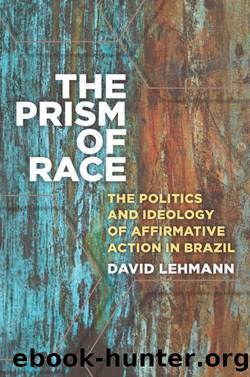The Prism of Race: The Politics and Ideology of Affirmative Action in Brazil by David Lehmann

Author:David Lehmann [Lehmann, David]
Language: eng
Format: epub
Publisher: University of Michigan Press
Race versus Income Quotas and Their Evaluation
When the assessment of eligibility for reparatory justice or scarce state-held resources is based on self-assignment, and when many people may be genuinely uncertain about where they fall on the colour spectrum, then doubts arise concerning the legitimacy or reliability of criteria of eligibility. The alternatives are either a socioeconomic “proxy” that circumvents the dilemmas of racial classification or a mix of race and socioeconomic criteria, as eventually emerged in the 2012 quotas law. But it is worth stating here that the socioeconomic “cut” (“recorte” as policymakers call it, in parallel with the “recorte etnico-racial”) plays an ambiguous role in these discussions. Many commentators and several institutions advocated and implemented proxy versions: in order to respond to the pressure for race-based affirmative action, they proceeded on the basis that blacks are on average poor and attend state schools because they cannot afford a private education, so universities could avoid the prickly decision about racial classification by creating quotas for public school graduates or else applying a means test on the assumption that the socioeconomic criterion would replicate symmetrically the notional racial quota. These devices were not universally welcomed, and some criticized them as at best an attempt to deflect race-based and identity-driven demands for recognition and reparation and at worst a denial that there is a problem of racial exclusion.
One effort in this direction was undertaken by UNICAMP. Initially the policy used was to award thirty extra vestibular marks to public school pupils and ten extra marks to negros and pardos. Given that this was out of a total of five hundred, it is not surprising that the proportion of low-income students admitted barely shifted from the starting point of 30 per cent in 2003 (Feres et al. 2013). However, after years of similarly disappointing results, in 2015 the university adopted more generous allowances with the intention that by 2017 half its entrants would be from state schools and 30 percent of them pretos, pardos, or indigenas. In 2016 it announced that it had achieved the goal one year ahead of time, with 51.9 percent of the 1,714 students admitted having been educated in public schools and 43 percent from those racial groups. Surprisingly, more than 80 percent of those admitted even to the highly competitive medicine course were from public schools.119
That figure of 43 percent is striking, and this sort of approach, based exclusively on a socioeconomic criterion (state school education) but applied generously, receives some support from Mendes and his colleagues (2016)—but the support needs qualification. On the basis of 27,415 applicants to the UERJ 2010 vestibular, they find (a) that without the racial quotas young people who are both black and from low-income families would hardly have any chance of admission to prestige courses, and applicants from low-income groups too often do not even achieve the minimum grades required for admission (Mendes et al. 2016: 312); (b) that “in all regressions whites perform better than the other groups,” but “the progressive
Download
This site does not store any files on its server. We only index and link to content provided by other sites. Please contact the content providers to delete copyright contents if any and email us, we'll remove relevant links or contents immediately.
| Anthropology | Archaeology |
| Philosophy | Politics & Government |
| Social Sciences | Sociology |
| Women's Studies |
The Secret History by Donna Tartt(19088)
The Social Justice Warrior Handbook by Lisa De Pasquale(12190)
Thirteen Reasons Why by Jay Asher(8910)
This Is How You Lose Her by Junot Diaz(6887)
Weapons of Math Destruction by Cathy O'Neil(6280)
Zero to One by Peter Thiel(5802)
Beartown by Fredrik Backman(5754)
The Myth of the Strong Leader by Archie Brown(5507)
The Fire Next Time by James Baldwin(5445)
How Democracies Die by Steven Levitsky & Daniel Ziblatt(5218)
Promise Me, Dad by Joe Biden(5153)
Stone's Rules by Roger Stone(5088)
A Higher Loyalty: Truth, Lies, and Leadership by James Comey(4964)
100 Deadly Skills by Clint Emerson(4925)
Rise and Kill First by Ronen Bergman(4789)
Secrecy World by Jake Bernstein(4753)
The David Icke Guide to the Global Conspiracy (and how to end it) by David Icke(4719)
The Farm by Tom Rob Smith(4509)
The Doomsday Machine by Daniel Ellsberg(4490)
